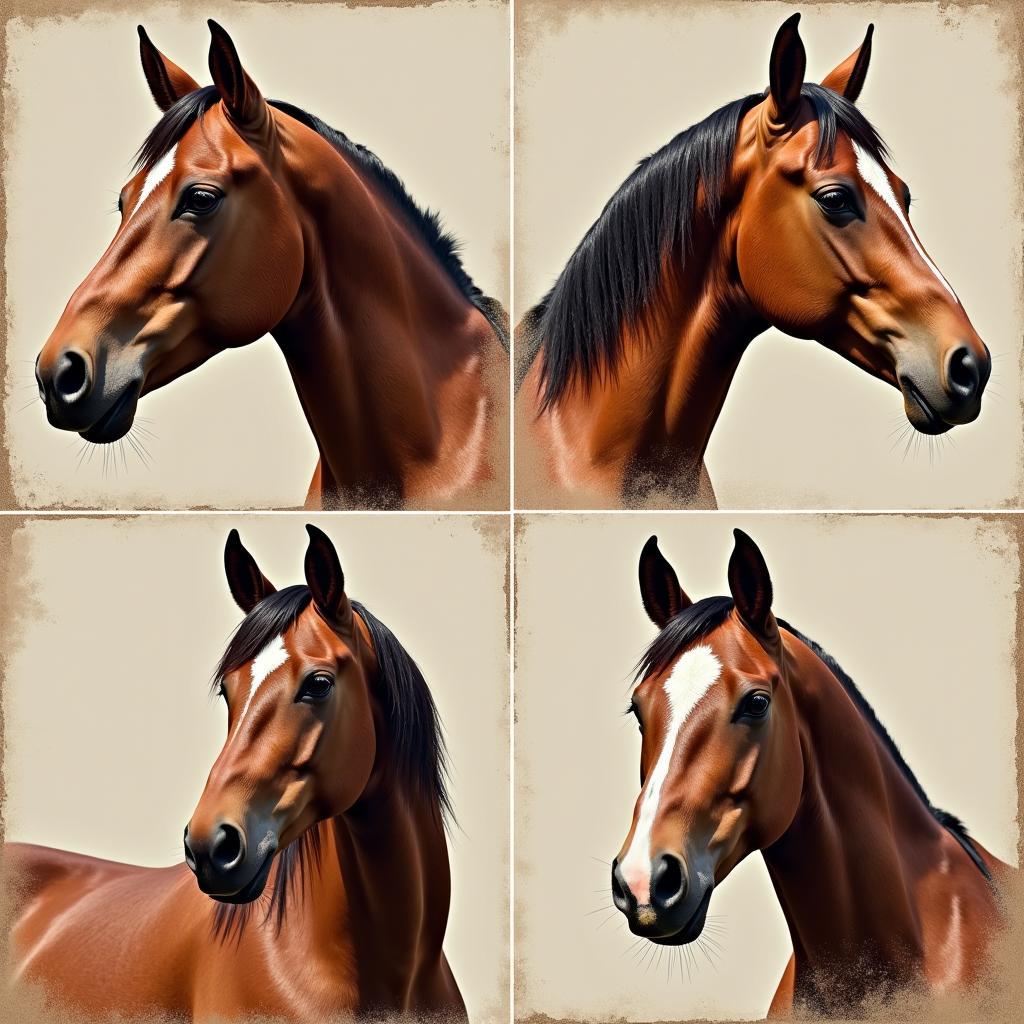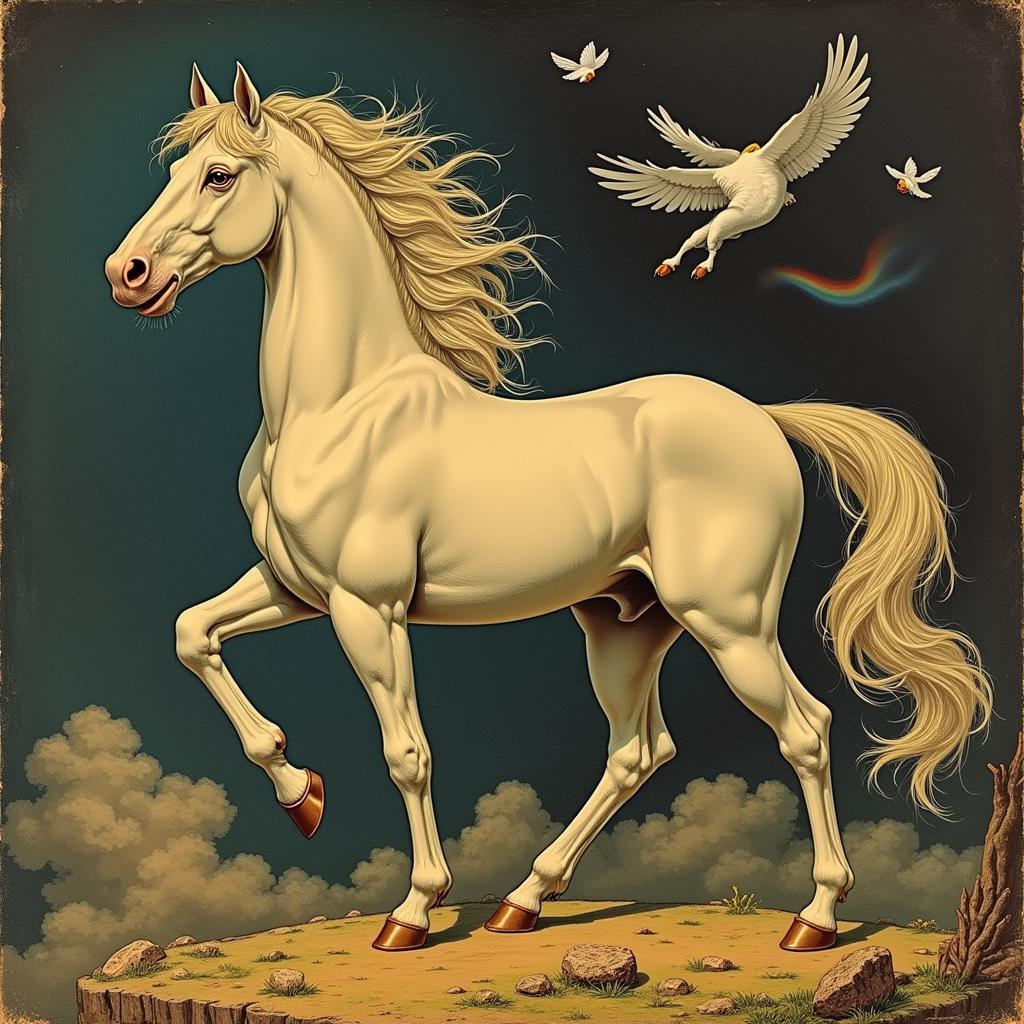The “Whistler Horse” is a term often whispered in equestrian circles, sparking curiosity and debate. But what exactly defines a Whistler horse? Is it a specific breed, a physical characteristic, or simply a captivating legend passed down through generations? This exploration delves into the heart of the matter, seeking to unravel the truth behind this intriguing moniker.
 Horse Breeds Known for Whistling
Horse Breeds Known for Whistling
While no single breed lays exclusive claim to the term “Whistler horse,” certain breeds have gained a reputation for producing individuals with this unusual respiratory trait. These include the American Saddlebred, the Missouri Fox Trotter, the Tennessee Walking Horse, and the Rocky Mountain Horse. Interestingly, the whistling sound isn’t limited to a particular breed, suggesting it might be linked to a combination of genetics and respiratory conformation.
Understanding the Whistle: Causes and Characteristics
The whistling sound associated with these horses originates from a partially obstructed airway, typically within the larynx or nostrils. This obstruction, often caused by a flaccid soft palate or narrowed nostrils, creates a whistling noise during inhalation or exhalation. The sound can range from a subtle whistle to a pronounced roar, and its intensity often varies depending on the horse’s level of exertion.
“It’s important to remember that not all horses that whistle have a medical condition,” says Dr. Emily Carter, DVM, an equine veterinarian specializing in respiratory health. “Some horses naturally produce a soft whistle during exercise, and it doesn’t affect their performance or well-being.”
The Whistler Horse in History and Folklore
Throughout history, horses exhibiting unusual traits, like the Whistler, often found themselves woven into folklore and mythology. In some cultures, a whistling horse was considered a sign of good fortune, while others associated it with otherworldly powers or a connection to the spirit world. These beliefs, often passed down through generations, contributed to the mystique surrounding these unique animals.
 Historical Depiction of a Whistling Horse in Folklore
Historical Depiction of a Whistling Horse in Folklore
Caring for a Whistler Horse
If you suspect your horse might be a “Whistler,” it’s crucial to consult with an equine veterinarian to rule out any underlying medical conditions. While some horses naturally produce a whistling sound without any adverse effects, a veterinarian can determine if the whistle is benign or indicative of a more serious respiratory issue that requires attention.
Proper management and care are essential for any horse, but those exhibiting respiratory peculiarities, like whistling, may benefit from specific considerations. These include:
- Regular Veterinary Checkups: Routine examinations can help monitor the horse’s respiratory health and address any potential concerns early on.
- Environmental Management: Ensuring proper ventilation in the stable and minimizing dust exposure can help maintain optimal respiratory health.
- Exercise Adaptation: Adjusting the intensity and duration of exercise to the horse’s individual needs can help prevent respiratory distress.
The Whistler Horse: A Unique Equine Companion
The “Whistler horse,” whether a product of folklore or a result of unique respiratory mechanics, remains a fascinating aspect of the equine world. While the whistling sound might initially raise concerns, it’s crucial to approach it with informed curiosity and seek professional guidance when necessary. By understanding the potential causes and providing appropriate care, we can appreciate these unique animals for their individuality and continue to unravel the mysteries surrounding the enigmatic Whistler horse.
FAQs about Whistler Horses
1. Is a whistling sound always a sign of a problem in horses?
Not necessarily. Some horses naturally whistle during exercise without any health implications. However, it’s essential to consult a veterinarian to rule out any underlying medical conditions.
2. Can a horse stop whistling?
In some cases, surgical intervention might be necessary to correct anatomical abnormalities contributing to the whistling. However, in other instances, management strategies can help mitigate the sound and its potential impact on the horse’s well-being.
3. Are Whistler horses more prone to respiratory problems?
While a whistling sound can sometimes indicate a respiratory issue, it doesn’t necessarily mean the horse is more susceptible to other respiratory problems. Regular veterinary care and proper management are crucial for maintaining optimal respiratory health in all horses.
4. Are certain disciplines more suitable for Whistler horses?
The suitability of a discipline for a Whistler horse depends on the severity of the whistling and any underlying medical conditions. Some disciplines might require greater respiratory exertion, which could be challenging for a horse with a pronounced whistle.
5. Can a horse be born a Whistler, or does it develop later in life?
Some horses are born with anatomical features that predispose them to whistling, while others might develop the trait later in life due to factors such as injury or illness.
Need More Help?
Have more questions about Whistler horses or other equine concerns? Don’t hesitate to reach out! Contact our team at Justus Horses USA:
Phone: 0772127271
Email: [email protected]
Address: QGM2+WX2, Vị Trung, Vị Thuỷ, Hậu Giang, Việt Nam.
Our dedicated team of equine experts is available 24/7 to assist you with any questions or concerns you may have.